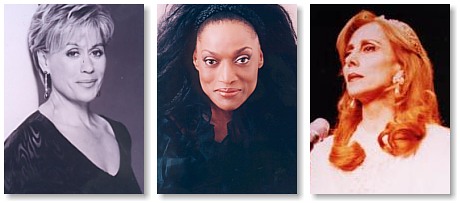|
The Year of the
Divas
You’ve heard of the three tenors.
Well, Beiteddine 2000 is the year of the three
divas.

Kiri Te Kanawa opened the festival,
and Jessye Norman and Fairouz are to follow. Given the
famously temperamental reputation of divas, it strange then
that festival president Nora Jumblatt reports no problems with
any of the three.
"It’s been lovely dealing with Kiri
Te Kanawa and Jessye Norman," says Mrs Jumblatt. "Fairouz has
been beautiful - she came for Montserrat Caballe in 1997,
looked round and said, ‘Heida Beiteddine’ [so this is
Beiteddine]."
Believe that if you will. It’s not
what divas are known for. Elizabeth Schwarzkopf chose all her
own records when she went on the BBC's Desert Island Discs.
Kathleen Battle threw all the clothes of a fellow soprano out
of a dressing room she wanted.
But diva means divine. Cue Kiri Te
Kanawa. When, 29 years ago, she made her sensational Covent
Garden as Countess Almaviva in Mozart’s The Marriage of
Figaro, William Mann, opera critic of The Times, rasped: "She
looks and moves like a teenage goddess."
From singing at the Prince of
Wales’ wedding - TV audience a mere 600 million - to drawing a
billion TV watchers for a millennium broadcast from her native
New Zealand, Te Kanawa has been adored worldwide. Her
‘crossover’ records - like Bernstein’s West Side Story, South
Pacific and My Fair Lady - also helped, but she delighted the
cognoscenti too with roles like Desdemona in Verdi’s
Othello.
Personal difficulties over the past
five years - divorce and a public splat with a long-lost
brother - have done nothing to diminish Te Kanawa’s artistry,
even if they have made her more withdrawn. "It's very
difficult to be friendly with a gypsy and that’s what singers
are," she told one interviewer.
Te Kanawa’s Beiteddine program
showcased her versatility. The highlights were the final
encore - an unaccompanied Maori song; Marietta’s Lute Song,
the most popular number from Korngold’s 1920 opera Die tote
Stadt; and Elizabeth’s Tu che le vanita from Verdi’s Don
Carlos.
Speaking of which, Jessye Norman
famously sued Classic CD for suggesting that when once trapped
in a swing door and advised to go sideways, she said: "Honey,
I ain’t got no sideways."
Make of that what you will. Norman
has a voice that is, wrote one critic "double-cream from top
to bottom" and projects "a mesmeric intensity of thought and
feeling."
Norman has sung Mahler, Berlioz and
Strauss but she brings to Beiteddine the music of fellow
American Duke Ellington, whose 100th anniversary we marked
last year. Ellington’s three sacred concerts, given towards
the end of his career, were among the richest of his
achievements.
Norman has performed the repertoire
- to critical acclaim - at the Barbican and Carnegie Hall.
Twenty separate pieces are woven together with a choir, string
quartet and jazz rhythm section. Look out for bassist Ron
Carter - best known to jazz fans from the Miles Davis quintet
of the 1960s - and saxophonist James Moody.
Fairouz at Beiteddine will be very
different to Fairouz at Baalbek - a recital rather than a
musical play, and sung live without playback. Direction will
be by Ziad Rahbani, making this apparently the first public
performance together of mother and son in Lebanon.
"As I understand it," says Mrs
Jumblatt, "they’ll be some old songs and some new
things."
The festival’s poster features
Fairouz from Mish Kayen Hayk T’Koun, which suggests we may
hear some of the songs from that album. "There will also be
some surprises," adds Mrs Jumblatt.
For sure. With divas - like Tiri Te
Kanawa, Jessye Norman and Fairouz - there will always be
surprises. That’s just one reason why we love them so
much.
Written by:
Gareth Smyth
| 
